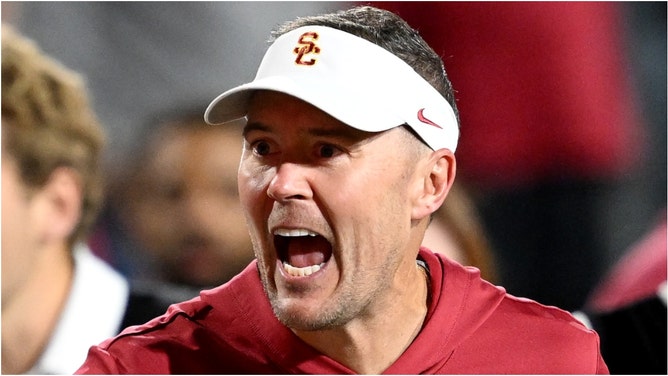We support our Publishers and Content Creators. You can view this story on their website by CLICKING HERE.
It’s officially transfer portal season in college football, and with it comes the frustrating realization that there’s little point in getting attached to the players on your favorite team’s roster. Former five-star recruits, starting players, promising freshmen and sophomores progressing through a young career…there’s no way to predict who or who will not enter the portal.
If it’s starting to feel like it’s not the same college football most remember from their youth, it’s because it isn’t. It’s essentially a professional sport now. And that’s not an outsider’s opinion either, it’s shared by many involved at the top programs in the country. Including USC Trojans head coach Lincoln Riley.
Riley spoke recently on a USC-run show and gave a lengthy answer to what the modern transfer portal means, how kids are using it, and what the program and coaching staff has to consider as they go through the process.
“Everyone’s different. And it’s tough, because, we’re still the college model. I mean, a lot of these guys we know, we know well. A decent amount of ’em, not all of ’em, but a decent amount we recruited. But, we’re a college model that’s becoming a professional model. And, I know some people don’t want to say that, but it’s here. Like, it is what it is,” Riley said.
“And, the reality is, there are just some guys that you either can’t or are not gonna pay what they want, or you assess their value and it does not – just like, I mean, you guys have done the NFL thing, you’ve seen it. If your value doesn’t match the money, then, it’s not going to go well much longer, right? It’s not gonna go further. And it’s just, there’s a cutthroat part of that that’s just part of being a professional organization. And again, that’s what we’re becoming. And so, yeah, we’re having to make some tough decisions. We’re having to decide where to allocate reps, or where to allocate resources, roster spots, all of those things. You’re getting ready to reduce the roster size. You’re getting ready to have salary cap, essentially. I mean, like, that’s what we’re becoming. So you’re going to see that. And sometimes, all these transfers across the country, we’re no different. You’re going to see sometimes, people that feel like, I got a better opportunity to go play at this place or that place. And sometimes, more often than what people realize now, it’s the school telling the kid, ‘Hey, we’re sorry. That’s just is what it is right now. And that’s just, the business has really changed that way, but that’s what we all are.”

USC Trojans head coach Lincoln Riley discussed the transfer portal and the professional model in college sports. (Credit: Getty Images)
Lincoln Riley Tells Hard Truths About Modern College Football
Riley’s correct in that the professional model is well and truly here in modern college football. The days of getting attached to top high school prospects and seeing them develop and grow in one program are almost entirely over. The reality of the unrestricted portal system and NIL deals is such that players will be on the lookout for better deals and better situations.
Just as employees look for better opportunities elsewhere in other jobs. And while that’s understandable, it’s a massive shift from how the sport looked just a few short years ago.
The other reality is that, as Riley mentions, some of these transfers are based on schools telling players that they’re going to look elsewhere. Or that they aren’t going to be able to get better financial arrangements in their current program. It’s “cutthroat,” like Riley describes, but it’s an unavoidable reality in modern football.
More than ever, rooting for your favorite team means rooting for the name on the front of the jersey, because the names on the back are going to change. A lot.

 Conservative
Conservative  Search
Search Trending
Trending Current News
Current News 




